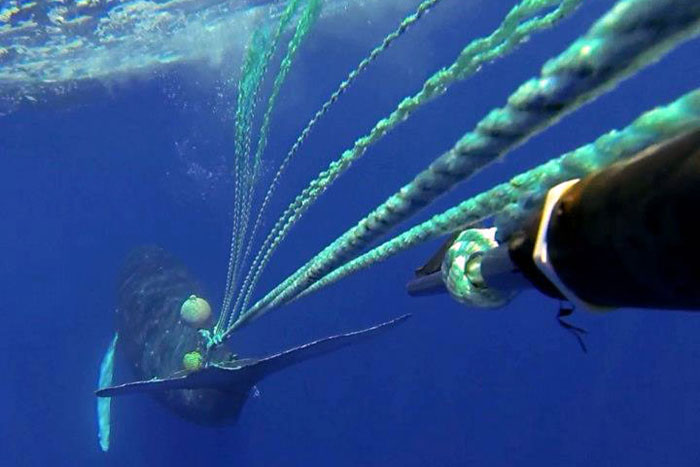After being caught in shrimp traps for five days, a 30-ton humpback whale off the Crescent City coast was successfully freed by a team of marine rescuers and volunteers on Tuesday afternoon, in what has been described as a Herculean effort by KTVU.
The whale swam around the rescue team’s boat a few times after being cut free from 12 buoys and 180 traps—an outpouring of gratitude from the whale in the eyes of one of the rescuers, said Michael Milstein, spokesman for the National Oceanic and Atmospheric Administration (NOAA) Fisheries West Coast Region.
Milstein said it is fortunate that the whale was strong enough to surface for air despite the weight of the fishing gear it was caught in. But it is likely that the whale didn’t eat for the five days, Milstein told KTVU.
NOAA is one of the agencies that leads such marine rescue efforts.

Following the death of an experienced Canadian responder during a North Atlantic right whale rescue on July 10, NOAA temporarily suspended the whale disentanglement activities of its nationwide network in order to review the safety protocols.
On July 18, the suspension was lifted for all large whales, except the right whale species. Unfortunately, the “unpredictable behavior” of the right whales poses safety challenges during rescue attempts, said NOAA Fisheries Assistant Administrator Chris Oliver in a statement.
“We will continue to work in close coordination with leading large whale experts to assess all the large whale rescue protocols and procedures and will continue to make human safety and welfare our top priority,” said Oliver.
Since the safety review, NOAA has introduced an additional online training module for members of the Large Whale Disentanglement Network. The training is designed to enforce key safety and protocol measures for responders.
Right whales rescue efforts may be authorized by NOAA Fisheries experts. The experts will consider rescue attempts on a case-by-case basis, but experienced Level 5 responders will be required.
While marine animal rescue responders are required to undergo specialized training, NOAA encourages members of the general public who see marine animals in distress to contact their local stranding network response organization.


